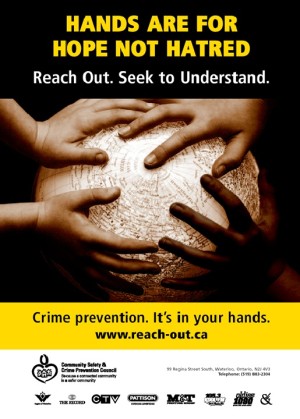By the numbers: Hate crimes in Waterloo Region
In 2009, the Kitchener-Cambridge-Waterloo census metropolitan area (CMA) had the highest hate crime rate in Canada, according to police reported statistics. Did you catch the end of that sentence? “…..according to police reported statistics”. It might seem insignificant, but it might be the key to understanding why the 2009 hate crime rate in Waterloo Region is so high compared to other CMAs in Canada.
A criminal offence against a person or property is considered a hate crime when there is evidence that the offence was motivated by hate, based on the victim’s: race, ethnic origin, language, colour, religion, sex, age, mental or physical disability, sexual orientation, or other similar factors. In 2009, in Waterloo Region, Police identified 93 crimes that fit this definition. While the number doesn’t tell us the nature of these reported hate crimes, these 93 situations represent the number of crimes that came to the attention of police that were classified as hate crimes in 2009.
But before we jump to conclusions about Waterloo Region being a hot bed of hate and discrimination, we might want to take a look at other cities and regions. St. John’s, Saint John, Barrie and Thunder Bay reported zero hate crimes incidents in 2009 and Saguenay, Trois-Rivieres and Greater Sudbury reported one hate crime incident each. When it comes to any urban centre, we can be reasonably confident that zero or one hate crime per year might have more to say about what comes to the attention of police and how it is classified than reality.
What we might conclude from the Census Metropolitan report in 2009 is that the reporting approaches are at this time too diverse to portray an accurate cross city picture. Comparisons between jurisdictions require similar reporting standards and such consistency did not exist in 2009. Thus, higher numbers might point to a more rigorous reporting and/or greater community attention to an issue.
By just looking at the numbers alone, Kitchener-Waterloo was put on one of eight worst places in Canada to move to for immigrants. This use of data without context was easy to share as a quick sound bite, but provided a woefully inaccurate picture of the community.
But the report is not fully useless by any stretch of the imagination. What we can and should do is use the data to compare hate crime rates over time. Such comparison works on the assumption that Waterloo Regional Police Service are more or less consistent in how they define and report hate crimes from year to year. On that basis Waterloo Region saw a steady decline in hate crimes from 93 in 2009, to 55 in 2010, to 41 in 2011 and 30 in 2012. That is a promising emerging trend. There is a BUT…
One hate crime is simply one hate crime too many. Crime prevention and the creation of a peaceful (read “inclusive”) society are intimately linked. And there can be no peace without inclusion. Understanding the nature of hate crimes in Waterloo Region should be a critical next step in our shared goal of creating a community that is safe for everyone. Armed with information about who the victims of hate crimes are, who has committed the offences, and what trends we observe overall provides us with data that can help us to begin to prevent these crimes.
 In 2012, the KW Multicultural Centre, along with numerous community partners developed a series of workshops designed to help community members better understand hate crimes, learn how to recognize potential hate crimes, how to help victims and what to do in the event of witnessing an incident that might be a hate crime. The workshop materials were designed in a way that those who completed it could deliver the workshop to other groups. To date, more than 15 workshops have been conducted in our community with over 250 people taking the training. These and other efforts help to raise awareness about the importance of hate crime prevention.
In 2012, the KW Multicultural Centre, along with numerous community partners developed a series of workshops designed to help community members better understand hate crimes, learn how to recognize potential hate crimes, how to help victims and what to do in the event of witnessing an incident that might be a hate crime. The workshop materials were designed in a way that those who completed it could deliver the workshop to other groups. To date, more than 15 workshops have been conducted in our community with over 250 people taking the training. These and other efforts help to raise awareness about the importance of hate crime prevention.
In an effort to do our part and continue the dialogue and problem solving, the Waterloo Region Crime Prevention Council recently released a RAP Sheet on Hate Crimes. The RAP sheet contains a number of suggestions on “what you can do” to address and prevent hate crimes. We are also committed to continuing to watch the data and educate ourselves by speaking to those who have lived experiences. Watch this page and our website for information we gather and for what we are learning. Also watch for how you can stay or get involved.
Meanwhile, we are keen to learn what you think! We are especially keen to learn what ideas you have to prevent hate crime before it happens.
Author: Anthony Piscitelli is Supervisor, Planning & Research with the Waterloo Region Crime Prevention Council. He collaborates on all research efforts published by WRCPC.
